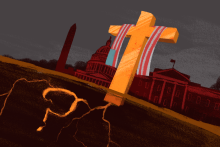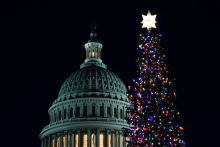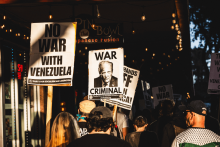Opinion

As we say goodbye (maybe even good riddance) to 2025, I’m reminded just how much prayer has served as an essential balm, refuge, and strong tower in the midst of such a trying and tumultuous year. Whatever 2026 has in store, I’m confident that we will need to flex our prayer muscles. Prayer centers us in God’s presence. Prayer prepares and equips us for courageous action. Prayer empowers us when we feel weak and encourages us when we feel demoralized.
I’m deeply grateful that we have a staff team that believes in the necessity of prayer, evidenced through the many short ones that they have shared below. My prayer as we sojourn together into 2026 is that our fervent prayers guide and embolden us to advance God’s reign of justice, peace, and steadfast love with greater urgency and courage.
For many of us who were raised Christian, our earliest memories of Christmas may have featured the town of Bethlehem. Whether through songs or the stories in scripture, this quaint town that welcomed the Christ child took on a central role in our faith.
On Thursday, Dec. 11, a man dismantled a nativity scene depicting Immigration and Customs Enforcement arresting the Holy Family at a Charlotte church. The now-viral video depicts the man knocking over the mannequins in ICE uniforms who appear to be detaining a kneeling Mary and Joseph.

I remember the first time I asked Mary to pray for me. It was at the height of the George Floyd protests in June 2020.
Our shared planet is crumbling under the weight of human greed and exploitation; our neighbors are being snatched up and disappeared from our communities; and money for jobs and education is being used to fund wars and genocide. And I’m expected to believe that God is good?

This Christmas, I’m looking forward to curling up on a snowy morning with one of my favorite stories: J.R.R. Tolkien’s The Lord of the Rings. Whether in book or film, Tolkien’s high fantasy remains politically relevant and holds a prescient message for the Advent season.
When President Donald Trump and New York Mayor-elect Zohran Mamdani first met back in November, I had to laugh. Partially because there is something deeply absurd about these two men—Mamdani, a self-proclaimed Democratic Socialist, and Trump, who once proclaimed he wished to be a dictator for “one day”—smiling and posing for photos in the Oval Office. But I mainly found myself laughing because, despite the drastic differences between these two politicians, both have been critical to my own faith and political journey.

Over the past several months, the Department of Homeland Security has steadily released promotional videos recruiting Americans to join DHS agencies like Immigration and Customs Enforcement. These videos include clips of military agents loading into armored vehicles, bombs falling from planes, and overhead shots of barren cities.

One of my least favorite December rituals is putting up Christmas lights. I loathe having to untangle the strands and can never quite summon the patience to put them up as beautifully as many of our neighbors. Needless to say, our house will never win any Christmas light competition. At the same time, I love the beauty of a well-adorned house, glowing with light that cuts through the darkness and communicates joy.
But before we get to the light, we must first contend with the darkness.
From 2023 to 2024, I served as a Jesuit Volunteer with the purpose of helping educate high school students. I was repeatedly left awestruck by how easily young people today become dependent on and how effectively they can navigate online spaces.

The early seasons of Stranger Things hit different in 2025. I realized this as I rewatched the series ahead of the final season’s premiere. Watching federal agents sow mistrust and harm children no longer seems like a sci-fi nostalgia trip, and the creeping evil influence of the Upside Down feels more like commentary on current events than a Stephen King pastiche. In fact, in fighting for the world they want and practicing radical solidarity, the kids in Hawkins, Ind., teach us exactly the lesson we need for right now. Stranger Things might even be a modern-day parable.
When the show debuted in 2016, it was a smash hit and proved that Netflix could compete in the original-content arena. Following a group of teenagers and the adults they trust in a fight against the forces of evil, the show owes much of its success to ’80s nostalgia. The group has fought various monsters over its seasons, many of which took cues from Dungeons & Dragons, but Season 4 took a more psychological turn, focusing on a being that feeds on the ongoing trauma people in Hawkins have experienced in their personal lives.
As the Apostle Paul warns us in 1 Timothy 6:9: “But those who want to be rich fall into temptation and are trapped by many senseless and harmful desires that plunge people into ruin and destruction.” And if you want proof of Paul’s words, look no further than the release of Jeffrey Epstein’s emails.
In early November, Democrats won several key elections up and down the ballot in states like Virginia, Georgia, Pennsylvania, and, perhaps most notably, in New York, where Zohran Mamdani became the first Muslim, South Asian, Democratic Socialist mayor-elect in New York City’s history. For voters concerned about the Republican Party’s authoritarian lurch, it was a reminder that political wins on the left are still possible.

Let’s take a quick trip back to the fall of 2016. Justin Bieber, Drake, and Twenty-One Pilots are topping the charts. All the cool kids are bottle-flipping. And almost every adult I know is falling in line to vote for Donald Trump. I’m from the western side of Michigan, and my home county went to Trump by almost 30 percentage points.
I was just starting to develop political opinions at that time, but it shocked me how so many people—who I knew cared deeply about their own moral lives—could countenance voting for a candidate who made a mockery of Christian values like forgiveness and marital fidelity.
On Nov. 14, more than 100 clergy gathered to raise their voices to demand the closure of the Immigration and Customs Enforcement processing facility in Broadview, Ill., the release of all detainees, and that the Department of Homeland Security honor federal law by allowing detainees spiritual care.

The Trump administration is blowing boats to pieces off the coast of Venezuela.
At different points this year, I’ve been left with the unsettling feeling that I don’t have the emotional bandwidth to fully process—let alone respond to—all of what’s happening. Early in the year, we all acknowledged that this overwhelmed feeling was by design, part of the Trump administration’s “flood-the-zone” strategy, intended to weaken and divide its opposition.
I’ve been wrestling with this in light of the attacks the Trump administration is orchestrating in Venezuela. On one hand, I’m perplexed at why such a costly, unlawful, and frankly evil operation isn’t garnering louder public outcry; on the other hand, I know there is so much else on people’s minds. It’s not that we don’t care about it all—from Chicago to Palestine to Sudan to so many other places where we know there’s urgent suffering—but there’s only so much outrage we can process before weariness takes over.
And yet I can’t ignore what’s happening in Venezuela
Chicago is in a state of holy rage. Last Friday morning, I stood with many of my colleagues in ministry at a multifaith service outside the Immigration and Customs Enforcement processing facility in Broadview, Ill. It would be better to call this facility an abduction center, as those who are detained there have little to no contact with the outside world.

Every age of Christian art has wrestled with power. From the earliest icons to contemporary murals and prints, artists have used sacred imagery to question authority, confront injustice, and call the church to stay accountable to its own ideals. As chaplain Federico Cinocca writes, protest art can serve as “a precious ally to help theology in its [critical] role and uncover narratives that reinforce marginalization.”

Following a stronger-than-expected showing from Democratic candidates in last week’s elections, there's been a lot of media discourse about what the party can learn from these wins. Much of the focus has been on Zohran Mamdani’s mayoral victory in New York City.
With a fragile ceasefire between Israel and Hamas in place, it is tempting for many in the West to ignore the broader issues that Palestinians still face: Namely, increased settler violence and the state of Israel annexing more Palestinian land. I went to Palestine in August, while the war that was not a war still raged, and I saw firsthand the dire reality of Palestinians in the West Bank.